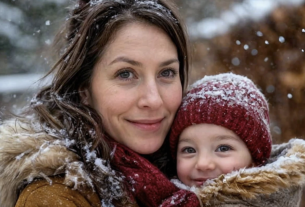“Do you clean the toilets here?” Victoria threw out with a smirk, stopping by my desk. Her voice—loud and deliberate—spread across the office floor, making even the clatter of keyboards pause for a moment.
She stood before me in a tight cream dress that fit her figure perfectly, with impeccable makeup and hair, as if she’d just stepped off the glossy pages of a magazine about the rich and beautiful. A leather designer bag dangled carelessly from her slender fingers, adorned with a massive diamond ring, and her gaze was filled with the cold arrogance so typical of her. I was watering a modest ficus in my simple beige blazer, feeling my colleagues’ curious eyes on me.
“No, Victoria,” I answered evenly, meeting her mocking look. “And you, I see, still haven’t learned to knock before entering someone else’s office. In polite society, that’s considered a basic rule.”
She merely snorted, as if my words were a child’s amusing babble, and pivoted easily on her sky-high heels, radiating complete disdain. I caught her tossing to someone in the hallway, deliberately loud: “Well, of course. An old school acquaintance—same boring, plain manners.”
I didn’t flinch. No rush of blood to my cheeks. No involuntary clench of my fingers. I simply dabbed the drops of water off the ficus leaf and returned to my work, to the reports waiting for my attention. Because it had been a very long time since I allowed Victoria—or anyone else—to decide what I was worth. I knew perfectly well we would meet again, but next time everything would be entirely different, and she would no longer be that self-adoring Victoria whose happiness was so fragile and uncertain.
Our paths first crossed many years ago in an ordinary school. She was the undisputed queen of the schoolyard: dazzlingly beautiful, brash, utterly confident in herself and in her right to command. I was just the quiet straight-A student who hid a keen gaze behind thick glasses and wore modest braids. She never stooped to open ridicule—that would have been too simple, too plebeian. But every “accidental” glance, every barely perceptible condescending smirk thrown my way seemed to say: “You’re nothing, and your world is as small and uninteresting as you are.” After graduation, our lives diverged decisively. I entered the economics faculty, moved to the capital to study, plunged into my coursework, and, thanks to persistence and brains, got a job at a large international company. Years passed; step by step I climbed the career ladder, first becoming head of promising projects, then director of strategic development at a major development firm. A loving husband appeared in my life, a wonderful son, a cozy apartment in the very center of the city, and a stable financial footing most people only dream of.
Victoria’s fate, as I learned from mutual acquaintances, took another path—more convoluted and dramatic. She married a wealthy man, but the marriage quickly collapsed—her husband caught her with a lover. Then came a string of short yet flashy affairs, steadily mounting debts, and loud scandals that became public. The last time I saw her photo on social media, she was striking a pose on the deck of a luxury yacht in the company of an elderly oligarch, but the ring on her finger was already gone.
And then, several years after that fleeting encounter at the office, she appeared on my horizon again. This time she stood at the door of my private office; I saw her reflection in the slightly open blinds on the window. My secretary knocked and stepped in carefully.
“Sofiya Konstantinovna, Victoria Semyonova is here for an interview.”
I almost laughed to myself, tasting the bitter irony. “But of course. Why not? The logic of fate.”
“Please send her in,” I nodded.
Victoria entered with the same triumphant smile as before, but now there was a clear nervousness and uncertainty at the corners of it. She sank gracefully into the chair opposite my desk, laid her résumé in front of me, and crossed her legs with habitual ease.
“What an unexpected meeting,” she said, trying to keep her voice casual. “I had no idea you worked here, let alone in such an office.”
“And I didn’t think you were looking for work at all,” I parried, without even glancing at the papers. “Especially given your long-standing, unwavering love of luxury and a carefree life.”
She paled, her fingers tightening slightly on the bag’s handle.
“People change, Sofiya. I’m very serious and responsible now. I want to start my life over with a clean slate, forget my past mistakes.”
“A clean slate?” I finally raised my eyes to hers, feeling steel harden in my gaze. “You didn’t even bother to find out that our company currently has no openings for so-called ‘public relations assistants’ who boldly write vague phrases in their résumés like ‘conflict resolution skills’ and ‘working with VIP clients.’ That sounds rather… abstract.”
Her shoulder twitched as she tried to keep the mask of indifference in place.
“It’s just a figure of speech, a bit of imagery. I actually can find common ground with all sorts of people. Especially those in high positions who make important decisions.”
“Especially when those decisions directly concern the state of their wallets,” I observed calmly.
She fell silent, and in her eyes—always so self-assured—something new flickered: not the familiar anger, but a deep confusion, even fear. She had apparently expected me to feel awkward, to blush, maybe even to try to justify myself for our shared past. I had no intention of playing by her old, worn-out rules.
“Listen,” she said much more softly now, for the first time with a note of sincerity. “I understand perfectly that in school… we didn’t always see eye to eye. But that’s all far behind us. I really want to work. Honestly, a lot. I have a child now. I really need—”
“You have a child?” I repeated, stressing the last word. “How old?”
“A girl, already three,” she answered, dropping her gaze. “Her name is Arisha.”
I simply nodded, and a thought flashed through my mind: “I wonder who her father is?”
“All right,” I said after a brief pause. “Let’s assume I’m willing to consider your candidacy. But our company has a strict rule: every applicant takes a special test for honesty and integrity. It’s our internal policy introduced after an unpleasant theft incident.”
She drew her perfectly plucked brows together.
“What test exactly? What is it?”
“Very simple. We ask only three key questions. All answers are recorded and then carefully cross-checked with our extensive database and verified for complete accuracy. If even one answer turns out to be knowingly false, the application is rejected immediately without explanation. And, more importantly, that information is promptly passed along to our entire partner network of recruiting agencies. Which means… you can forget about getting a job at any self-respecting company in this city.”
She grew even paler; her lips trembled.
“Is that… even legal? Those methods?”
“Absolutely legal and transparent. You signed consent for data processing when you entered the building, with security. You saw it, didn’t you?”
She nodded uncertainly, realizing she’d been cornered.
“In that case, let’s begin,” I said, taking out my tablet and turning on the recorder. “Question one: where exactly did you work for the last two years?”
“At the well-known PR agency ‘LuxMedia,’” she blurted quickly. “I handled strategic promotion of premium brands.”
“Incorrect,” I said coolly. “‘LuxMedia’ closed a year and a half ago due to bankruptcy. You got in for just two months, and they fired you for systematically siphoning off event budgets. Haven’t forgotten how you tried to write off several bottles of expensive champagne and a luxury dinner at an elite restaurant as ‘unforeseen expenses’ for yourself and… what was his name? Your companion then, Artyom?”
She shot to her feet, her face contorted with rage.
“Were you spying on me?! Did you have me followed?”
“No, Victoria. I’m simply doing my job carefully and well. Just as you… ‘did yours’ back then—slipping someone else’s expensive lipstick into my schoolbag and happily telling the homeroom teacher I’d stolen it.”
She froze as if struck by lightning.
“That was in eighth grade! It was so long ago!”
“And you, unfortunately, still behave as if you’re stuck in that very eighth grade. Only now, instead of trinkets like someone else’s lipstick, it’s other people’s money, other people’s husbands, other people’s lives and fates.”
She slowly, as if with great effort, sank back into the chair, letting her head drop to her chest. Her shoulders trembled.
“I just… really need a job. I’m up to my ears in debt. There’s no one to help me…”
“That, sadly, isn’t my problem,” I said gently but with unshakeable firmness. “But I am willing to give you one single chance. The last.”
Her tearful eyes lifted to me with hope.
“Really? You’re not joking?”
“Yes. But not here. Not in this company or this building. I have another, more suitable idea for you.”
Exactly a week later I drove to a modest shelter for women in difficult life situations, in one of the Moscow region’s small towns. Victoria was already waiting by the main entrance. No usual makeup, simple jeans, a worn jacket. She looked unbelievably tired, but there was something new in her eyes—calm, serious.
“Are you absolutely sure about this?” she asked, looking straight at me.
“Yes, I’m sure,” I nodded. “You’ll work here as a job-placement coordinator. Your task is to help women who, like you, have ended up in tough situations: find work, compile proper résumés, prepare for interviews. You’ve always known how to make a strong first impression. Let that skill serve a real purpose now, not just short-term gains.”
She nodded silently, absorbing every word.
“Why? Why did you decide to help me after everything?”
“Because I know from experience what it’s like to be cornered and feel utterly helpless. And also because I don’t want your little daughter someday to hear from someone the same hurtful, humiliating question: ‘Do you clean the toilets here?’”
She cried. Quietly—no theatrical sobs or hysterics—the way people cry at sudden relief.
“Thank you, Sofiya. Thank you so much.”
“No need for thanks. Just try not to let these women down—and, above all, don’t let yourself down.”
Several months passed. Victoria worked at the shelter with surprising honesty and dedication. She helped place several residents in good positions, using all her old contacts and natural charm, but now channeling them in the right direction.
Then one day a new junior employee, recently hired on Victoria’s recommendation, knocked on my office door. She brought a finished report on a new project; her movements were precise and sure. My eye happened to fall on her graceful hand, where a simple yet very beautiful silver bracelet gleamed—the exact twin of the one my mother had worn for years, a piece I would recognize anywhere.
“Forgive my curiosity—where did you get such a lovely bracelet?” I asked politely, feeling a strange stirring inside.
“It wasn’t bought, Sofiya Konstantinovna,” the girl smiled. “It’s a family heirloom. My grandmother passed it to my mother many years ago, and my mother, in turn, gave it to me recently for my birthday.”
I felt my heart stop.
“And what was your grandmother’s name, if you don’t mind?”
“Anna Petrovna,” came the simple, achingly familiar reply.
My heart began to pound wildly. Anna Petrovna—the name of my own mother. But as far as I knew, my mom had no other daughters besides me. Or… was there something I didn’t know?
“And your mother… where is she from?” I continued, trying to keep my voice even.
“She’s from Rostov. But she was born, if I’m not mistaken, in a small settlement near Voronezh. Unfortunately, she was placed in an orphanage when she was only three. Her parents—my grandparents—died in a terrible car accident.”
I rose slowly from my chair and walked to the large window, beyond which stretched the vast many-faced city where I had built my whole life. In that moment, it suddenly seemed strange and unfamiliar.
“What’s your name, dear?” I asked softly, almost in a whisper, still looking out the window.
“Alina,” she answered just as softly.
I took a deep breath, turned back to her, and tried to smile as naturally as possible.
“Alina… I happen to have a little time. Would you like to share a cup of hot tea with me? I have a lovely, fragrant bergamot.”
She smiled warmly.
“With great pleasure, Sofiya Konstantinovna.”
That evening I dialed my mother’s number; my fingers trembled slightly.
“Mom, you… you never told me I might have had a sister. Why?”
A long, heavy silence filled the line, and I heard my mother struggle to hold back tears.
“You must understand, dear… she came into the world after something terrible happened to me. I was assaulted. I was coming home late from work—there were several of them. They tormented me for a long time. My mind couldn’t bear it; I was severely traumatized. And I… I just couldn’t, didn’t want to see or hear anything about the child who was born from that horror. It was a little girl… And your father had no choice but to place her in a good orphanage. Later, when I gradually came back to myself and began to live again, she had already been adopted by another family—loving, but strangers.”
“I thought you would never learn about it,” she whispered through quiet sobs. “Your father and I didn’t want to wound or upset you. You were so fragile then, so sensitive after my illness… And then your school, your studies, your exams… We decided it would be better if we all just tried to forget.”
“Forget?” I echoed, my heart twisting with pain. “Mom, how can you simply forget your own child? How?”
“We didn’t forget her, Sofiyusha. Not for a single day. We secretly visited her, brought presents while she was very small and still in the orphanage. Then… then she was adopted and we lost every trace. We had no right to interfere in her new life.”
I sat in complete silence, staring at the big family photo on the wall: Mom, Dad, me in my graduation dress. And no one else. It seemed it had always been that way.
“Alina works at my company now,” I finally exhaled. “She’s incredibly smart, strong, and very, very beautiful. And you know, she looks astonishingly like you, Mom. The spitting image of you in your youth.”
My mother began to cry in earnest, pain and relief mingling in her sobs.
“Please bring her home to us, Yulechka. I beg you.”
The next day I invited Alina to lunch at a quiet, cozy restaurant not far from the office.
“I want to introduce you to an extraordinary woman,” I began carefully. “She has loved you with all her heart, always. She just… didn’t know how to find the right words or how to tell you everything. She was afraid of shattering your peace.”
Alina looked at me with mild puzzlement and curiosity.
“Who are you talking about, Sofiya?”
“About your birth mother.”
And Victoria? She’s still working at that shelter, having found a new calling and meaning in life there. Sometimes we share a coffee, recalling the past without bitterness or malice. She no longer smiles that condescending, icy smile. Now I read in her eyes sincere respect and a quiet, clear gratitude.
Sometimes life—so unpredictable and strange—gives us a second chance, not to repeat old mistakes, but to finally correct them after learning the important lessons. The main thing is not to miss that gift and not to ruin everything a third time, because there may be no more chances left. And the soft whisper of the past, like an echo, sooner or later finds us in the present, weaving the torn threads of our fates into one strong fabric



